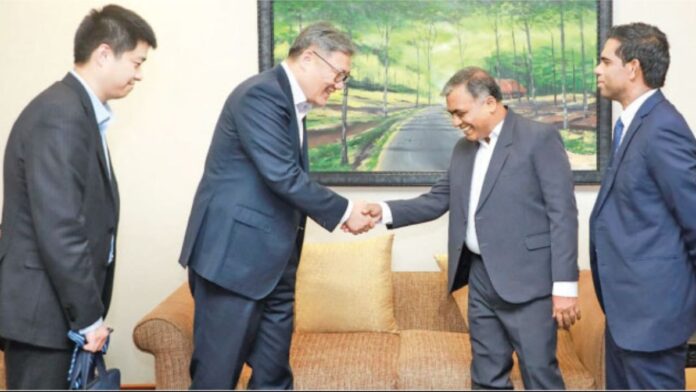By: Staff Writer
May 29, Colombo (LNW):Sri Lanka’s diplomatic balancing act between China and India faces renewed tests following the visit of a 115-member Chinese business delegation led by China’s Commerce Minister, alongside the arrival of Chinese research vessels in Sri Lankan waters.
China’s Commerce Minister Wang Wentao arrived in Colombo yesterday along with a strong 115-member business delegation drawn from 77 companies. He will keynote a top-level business forum tomorrow as well as meet with the leadership of the Government and senior Ministers.
The high-powered business delegation aims to boost economic ties and explore new investment opportunities in sectors including infrastructure, renewable energy, logistics, and tourism.
This visit is seen as part of China’s broader efforts to deepen economic influence in South Asia, particularly through initiatives linked to the Belt and Road Initiative (BRI).
Sri Lankan officials have welcomed the delegation, expressing optimism about attracting much-needed foreign direct investment and expanding export access to Chinese markets. Officials noted that such cooperation could contribute to the country’s ongoing economic recovery, especially in the wake of its debt crisis.
However, the concurrent presence of Chinese research vessels — some suspected of dual-use capabilities for intelligence gathering — has raised serious strategic concerns, particularly in neighboring India. Indian security analysts view these visits as a potential threat to regional security, citing the proximity of Sri Lankan ports to key Indian naval and missile installations.
India has previously voiced strong objections to Chinese naval presence in the Indian Ocean, arguing that such activity undermines its security interests. The continued arrival of Chinese vessels, even under the guise of scientific research, is likely to fuel fresh diplomatic friction between New Delhi and Colombo.
Analysts caution that while increased Chinese investment may offer short-term economic relief, it also risks drawing Sri Lanka deeper into China’s strategic orbit. Such a shift could jeopardize India’s development assistance and collaborative projects, including critical housing, energy, and transport initiatives.
Concerns are also growing domestically over the transparency of Chinese deals. Civil society groups warn of the potential for a repeat of scenarios like Hambantota Port, which was leased to a Chinese company on a 99-year agreement due to debt repayment failures.
Sri Lanka now faces the challenge of maintaining strategic neutrality while leveraging both Chinese and Indian engagement for national benefit. Experts suggest Colombo should establish clearer maritime protocols for foreign vessels, enhance transparency in investment agreements, and diversify its international partnerships to avoid overdependence on any single power.
As geopolitical tensions in the Indian Ocean escalate, Sri Lanka’s ability to balance economic ambition with strategic caution will be closely watched by regional and global powers alike.
